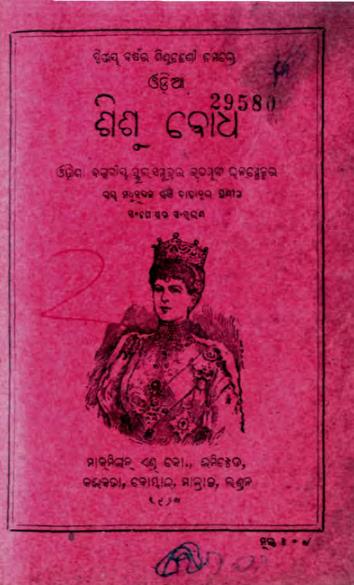In the vibrant history of Odia literature and education, the year 1923 stands out with the publication of Shishu Bodha by the esteemed author Madhusudan Rao. This textbook has had a profound impact on the educational landscape of Odisha, serving as a foundational tool for young learners and reflecting the progressive educational ethos of the early 20th century.
Shishu Bodha, translating to Child’s Enlightenment, is crafted specifically for children, aiming to instill in them a sense of curiosity, learning, and moral values. The primary objective of this book is not just to impart knowledge but to nurture a love for learning that would last a lifetime. Madhusudan Rao emphasizes the importance of holistic development in children—intellectually, morally, and socially—an idea that resonates strongly in modern educational philosophies.
What makes Shishu Bodha particularly remarkable is its comprehensive approach to education. The book covers a wide array of subjects, including language, mathematics, geography, history, and ethics. By providing a well-rounded foundation, it prepares young minds to engage with the world in a multifaceted manner. The content is presented in a clear and engaging style, ensuring that complex concepts are made accessible to young learners. This pedagogical strategy empowers students, fostering their critical thinking abilities at an early age.
Rao’s emphasis on the Odia language and culture is another significant aspect of Shishu Bodha. By using simple yet effective language and incorporating local idioms and proverbs, he helps children connect with their cultural heritage. This focus not only enriches the students’ understanding of their linguistic roots but also instills a sense of pride in their identity. The book champions the idea that education should be culturally relevant, a principle that remains crucial in today’s diverse educational environments.
Moreover, Shishu Bodha is noteworthy for its inclusion of moral teachings. Throughout the text, Rao weaves stories and examples that highlight virtues such as honesty, kindness, and perseverance. These moral lessons are designed to guide children not just academically but also personally, shaping them into responsible and compassionate individuals. By placing moral education on an equal footing with academic knowledge, Shishu Bodha presents a holistic vision of what it means to be educated.
The format of Shishu Bodha also deserves mention. It is designed to be interactive, encouraging participation through questions, exercises, and illustrations that captivate young minds. This interactive approach fosters engagement and makes the learning process enjoyable, which is vital for sustaining interest and enthusiasm in early education.
The historical context of Shishu Bodha adds another layer of significance. Published during a period of social awakening in India, the book contributed to the growing recognition of education as a fundamental right. It reflects the aspirations of the time, as communities sought to empower their children through knowledge, preparing them to navigate a rapidly changing world.
As we reflect on the impact of Shishu Bodha, its legacy endures. This textbook has not only educated generations of Odia children but has also set a standard for future educational resources. It continues to inspire educators and authors to create materials that are culturally relevant, engaging, and enriching.
Books Info
| Books name | Shishu Bodha / ଶିଶୁ ବୋଧ |
| Author | Madhusudan Rao |
| No Of pages | 37 |
| Publisher | NA |
| Publication | 1923 |
| Printed At | NA |
| Distributor | NA |

